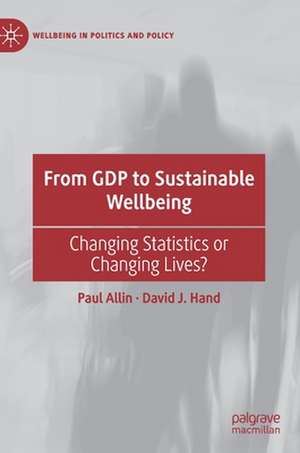From GDP to Sustainable Wellbeing: Changing Statistics or Changing Lives?: Wellbeing in Politics and Policy
Autor Paul Allin, David J. Handen Limba Engleză Hardback – 28 aug 2020
This book is about the function and use of official statistics. It welcomes the aspiration for official statistics to be an indispensable element in the information system of a democratic society, serving the government, the economy and the public with data about the economic, demographic, social and environmental situation. The book identifies the political role of official statisticians, who decided what gets measured as well as how it is measured. While thousands of official statistics are published every year, and some are quoted by politicians, used by policy-makers or reported in the media, the authors observe that, in the main, official statistics do not feature much in everyday lives of people and businesses. The book concludes with suggestions for more that should be done, especially in the context of improving wellbeing and helping meet the worldwide set of sustainable development goals set for 2030.
Din seria Wellbeing in Politics and Policy
-
 Preț: 54.03 lei
Preț: 54.03 lei - 18%
 Preț: 1111.97 lei
Preț: 1111.97 lei -
 Preț: 223.19 lei
Preț: 223.19 lei -
 Preț: 422.52 lei
Preț: 422.52 lei -
 Preț: 384.48 lei
Preț: 384.48 lei -
 Preț: 416.54 lei
Preț: 416.54 lei
Preț: 418.45 lei
Nou
Puncte Express: 628
Preț estimativ în valută:
80.07€ • 84.05$ • 66.46£
80.07€ • 84.05$ • 66.46£
Carte tipărită la comandă
Livrare economică 10-24 aprilie
Preluare comenzi: 021 569.72.76
Specificații
ISBN-13: 9783030530846
ISBN-10: 3030530841
Pagini: 144
Ilustrații: XIX, 144 p. 1 illus.
Dimensiuni: 148 x 210 mm
Greutate: 0.35 kg
Ediția:1st ed. 2021
Editura: Springer International Publishing
Colecția Palgrave Pivot
Seria Wellbeing in Politics and Policy
Locul publicării:Cham, Switzerland
ISBN-10: 3030530841
Pagini: 144
Ilustrații: XIX, 144 p. 1 illus.
Dimensiuni: 148 x 210 mm
Greutate: 0.35 kg
Ediția:1st ed. 2021
Editura: Springer International Publishing
Colecția Palgrave Pivot
Seria Wellbeing in Politics and Policy
Locul publicării:Cham, Switzerland
Cuprins
1.Introduction.- 2.Setting the scene.- 3.Using statistics to assess progress.- 4.Statistics and public policy.- 5.Wider audiences for new measures of progress.- 6.Inputs and outputs: Data science and the role of media.- 7.Conclusion.
Notă biografică
Paul Allin is a Visiting Professor at Imperial College London, UK, researching the use of wellbeing measures. He was previously a Statistician, Researcher and Policy Analyst in various UK government departments and agencies, including directing the Measuring National Wellbeing programme at the Office for National Statistics. He is the author, with David Hand, of The Wellbeing of Nations (2014).
Textul de pe ultima copertă
This book is about the function and use of official statistics. It welcomes the aspiration for official statistics to be an indispensable element in the information system of a democratic society, serving the government, the economy and the public with data about the economic, demographic, social and environmental situation. The book identifies the political role of official statisticians, who decided what gets measured as well as how it is measured. While thousands of official statistics are published every year, and some are quoted by politicians, used by policy-makers or reported in the media, the authors observe that, in the main, official statistics do not feature much in everyday lives of people and businesses. The book concludes with suggestions for more that should be done, especially in the context of improving wellbeing and helping meet the worldwide set of sustainable development goals set for 2030.
Paul Allin is a Visiting Professor at Imperial College London, UK, researching the use of wellbeing measures.
Caracteristici
Argues that official statistics are not living up to the promise that they should be indispensable in democratic society Explores the function and use of official statistics, drawing on experience of UK and European statistical systems Asks how national statistics offices can better engage with the public, businesses, and civil society
